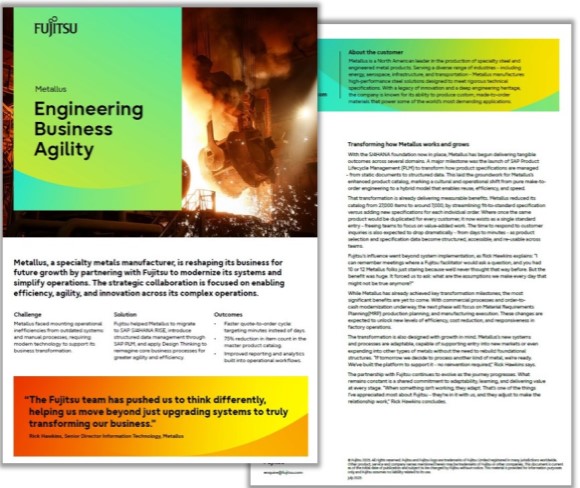Metallus Engineering Business Agility

Metallus, a specialty metals manufacturer, is reshaping its business for future growth by partnering with Fujitsu to modernize its systems and simplify operations. The strategic collaboration is focused on enabling efficiency, agility, and innovation across its complex operations.
Challenges
Metallus faced mounting operational inefficiencies from outdated systems and manual processes, requiring modern technology to support ist business transformation.
Solutions
Fujitsu helped Metallus to migrate to SAP S/4HANA RISE, introduce structured data management through SAP PLM, and apply Design Thinking to reimagine core business processes for greater agility and efficiency.
Outcomes
- Faster quote-to-order cycle: targeting minutes instead of days
- 75% reduction in item count in the master product catalog
- Improved reporting and analytics built into operational workflows
“The Fujitsu team has pushed us to think differently, helping us move beyond just upgrading systems to truly transforming our business.”
Rick Hawkins, Senior Director Information Technology, Metallus Inc.
75%
reduction in item count
in the master product
catalog
- Industry: Manufacturing
- Location: North America
- Customer's website

About the customer
Metallus is a North American leader in the production of specialty steel and engineered metal products. Serving a diverse range of industries - including energy, aerospace, infrastructure, and transportation - Metallus manufactures high-performance steel solutions designed to meet rigorous technical specifications. With a legacy of innovation and a deep engineering heritage, the company is known for its ability to produce custom, made-to-order materials that power some of the world’s most demanding applications.
Metallus’s challenges were multifaceted - spanning operational inefficiency, outdated systems, and structural rigidity that limited innovation. Internally developed legacy systems had become costly and increasingly difficult to maintain, with few engineers left who understood the aging technology. At the same time, the company’s core processes were heavily manual, often requiring on-the-fly product engineering to fulfill orders.
Additionally, Metallus’s systems were tightly tied to a specific business model that no longer reflected the company’s ambitions or evolving customer needs. The complexity of the legacy processes slowed down customer response times and impacted competitiveness - especially in time-sensitive markets where speed could determine whether a contract was won or lost. “In some of the markets we serve, that lost time meant we didn’t win the business. That was unacceptable - we had to change,” explains Rick Hawkins, Senior Director Information Technology, Metallus Inc.
Engineering a modern enterprise with SAP S/4HANA
After reviewing multiple consulting partners, Metallus selected Fujitsu for their end-to-end transformation capabilities, including planning, execution, and ongoing support. Recognizing the long and complex journey ahead, Metallus valued Fujitsu’s technical expertise, agile approach, and ability to guide iterative transformation cycles.
One of the earliest critical decisions was to migrate immediately to SAP S/4HANA RISE, rather than delay and innovate on the older SAP ECC 6 platform. This forward-looking move positioned Metallus to take advantage of SAP’s innovation roadmap, including new tools like AI-based capabilities and embedded analytics.
“We said let’s get the upgrade behind us while the implementation is still relatively small and simple. That way, we could innovate on top of it instead of chasing deadlines later,” Rick Hawkins explains.
Alongside the technical upgrade, Fujitsu introduced Design Thinking workshops and process mapping to challenge Metallus to think beyond transactions and consider the full customer and business experience - from inquiry to fulfillment to cash collection.
Fujitsu’s collaborative model brought structure and innovation to Metallus’s transformation. Through iterative Design Thinking workshops and process blueprinting, the Metallus team was challenged to consider end-to-end flows - far beyond their traditional operational lens. “It was hard at first. We’re engineers - we like details. But Fujitsu kept asking us to think big. That made all the difference,” Rick Hawkins adds. “Fujitsu also adapted dynamically to evolving project needs, offering both technical depth and the flexibility needed to keep a multi-year transformation on track.
Transforming how Metallus works and grows
With the S/4HANA foundation now in place, Metallus has begun delivering tangible outcomes across several domains. A major milestone was the launch of SAP Product Lifecycle Management (PLM) to transform how product specifications are managed - from static documents to structured data. This laid the groundwork for Metallus’s enhanced product catalog, marking a cultural and operational shift from pure make-to-order engineering to a hybrid model that enables reuse, efficiency, and speed.
That transformation is already delivering measurable benefits. Metallus reduced its catalog from 27,000 items to around 7,000, by streamlining fit-to-standard specification versus adding new specifications for each individual order. Where once the same product would be duplicated for every customer, it now exists as a single standard entry - freeing teams to focus on value-added work. The time to respond to customer inquiries is also expected to drop dramatically - from days to minutes - as product selection and specification data become structured, accessible, and re-usable across teams.
Fujitsu’s influence went beyond system implementation, as Rick Hawkins explains: “I can remember meetings where a Fujitsu facilitator would ask a question, and you had 10 or 12 Metallus folks just staring because we’d never thought that way before. But the benefit was huge. It forced us to ask: what are the assumptions we make every day that might not be true anymore?”
While Metallus has already achieved key transformation milestones, the most significant benefits are yet to come. With commercial processes and order-to-cash modernization underway, the next phase will focus on Material Requirements Planning(MRP) production planning, and manufacturing execution. These changes are expected to unlock new levels of efficiency, cost reduction, and responsiveness in factory operations.
The transformation is also designed with growth in mind. Metallus’s new systems and processes are adaptable, capable of supporting entry into new markets or even expanding into other types of metals without the need to rebuild foundational structures. “If tomorrow we decide to process another kind of metal, we’re ready. We’ve built the platform to support it - no reinvention required,” Rick Hawkins says.
The partnership with Fujitsu continues to evolve as the journey progresses. What remains constant is a shared commitment to adaptability, learning, and delivering value at every stage. “When something isn’t working, they adapt. That’s one of the things I’ve appreciated most about Fujitsu - they’re in it with us, and they adjust to make the relationship work,” Rick Hawkins concludes.
Training programs delivered by a diverse range of instructors
Fujitsu brought in a diverse group of experts from both inside and outside the organization to deliver a structured curriculum covering key areas of digital knowledge. Among the most well-received sessions was a workshop on organizational transformation management, which allowed participants to simulate the full DX lifecycle—from planning and promotion to execution and operations. Another course that received strong feedback focused on the basics of writing Requests for Proposals (RFPs). Many participants appreciated the opportunity to learn how to analyze project goals and define requirements—skills that had often been neglected in the past, as tasks were frequently handed off entirely to vendors. “The program highlighted key elements of digital transformation that are hard to gain from standard training,” said Taichiro Yanabe, Chief Consultant. Before the course, participants and their managers aligned on a shared DX vision. Afterward, many began drafting concrete DX proposals with their supervisors. The training also sparked more active communication across teams. Unlike training for a specific task, true development lies in helping individuals recognize what they lack,” said Masanori Shirai, Strategic Planning Group Leader of DX Promotion Department.
Building an organization where everyone drives digital transformation
Saito emphasizes the mindset needed for DX talent development in one word: passion. “People are drawn to passion. Driving DX requires a spirit of challenge and a willingness to embrace change. We aim to create an environment that fosters this mindset. While measuring the impact of training remains a future challenge, we look forward to continued support from Fujitsu,” he said. Teijin positions DX training as a strategic investment to drive innovation. Fujitsu is proud to support this initiative and, through Fujitsu Uvance, remains committed to leveraging digital technology to foster individual growth, boost organizational productivity, and strengthen employee engagement.
Related Customer stories



Estonian Unemployment Insurance Fund

